February 1966
| << | February 1966 | >> | ||||
|---|---|---|---|---|---|---|
| Su | Mo | Tu | We | Th | Fr | Sa |
| 1 | 2 | 3 | 4 | 5 | ||
| 6 | 7 | 8 | 9 | 10 | 11 | 12 |
| 13 | 14 | 15 | 16 | 17 | 18 | 19 |
| 20 | 21 | 22 | 23 | 24 | 25 | 26 |
| 27 | 28 | |||||

February 3, 1966: Soviet probe Luna 9 sends back the first pictures transmitted from the Moon's surface
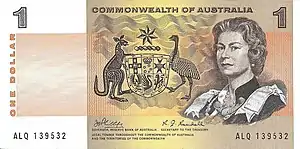
February 14, 1966: Australia goes decimal, introduces the dollar...
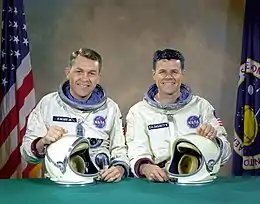
February 28, 1966: U.S. astronauts Charles Bassett and Elliot See die in plane crash three months before scheduled Gemini 9A mission
.jpg.webp)
...and phases out the pound
The following events occurred in February 1966:
February 1, 1966 (Tuesday)
- West Germany bartered for the release of 2,600 political prisoners from East Germany by a transaction involving the export of $24,250,000 worth of West German consumer goods to their East German neighbors, in return for allowing the prisoners to depart the Communist nation. The New York Times described the agreement as "payment of ransom of up to $10,000 per prisoner".[1] The goods, scarce in the East and abundant in the West, were items such as coffee, fresh fruit and butter, as well as fertilizer.[2]
- International pressure against the white-minority government of Rhodesia (now Zimbabwe) was stepped up when three major airlines serving the nation— British Overseas Airways Corporation (BOAC), British United Airways and Alitalia— made their last flights into the capital at Salisbury (now Harare), then departed and canceled further service.[3]
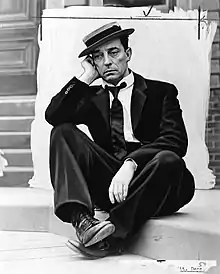
Keaton
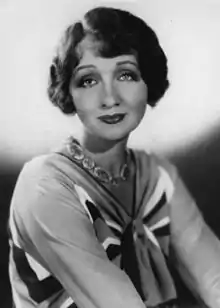
Hopper
- In the United States, 19 employees of the John W. Campbell farms in Dade County, Florida, were killed when the bus they were riding in was struck by a freight train. The men were being brought home after a day's work of harvesting vegetables, and the Seaboard Lines train was on its way to the farm to pick up the cars that had been loaded with produce. All of the dead were migrant workers from Puerto Rico, and most of them were young men in their 20s.[4][5]
- Died:
- Buster Keaton, 70, American film comedian
- Hedda Hopper, 80, American gossip columnist
February 2, 1966 (Wednesday)
- American adventurer Nick Piantanida set off in the Strato Jump II from a park in Sioux Falls, South Dakota, in an attempt to make the highest parachute jump ever, and inadvertently reached the highest altitude ever reached by a balloonist. When he reached his target altitude of 110,000 feet, he prepared to jump and then discovered that the oxygen hose that tethered him to the gondola was frozen and could not be disconnected. While he struggled to set himself free, the balloon continued to climb until he was more than 23 miles high. At 123,500 feet, he aborted the parachute jump, separated the gondola from the balloon, and spent the next 32 minutes descending to Earth while the gondola's parachute system slowed his fall. Besides not being able to set the parachute record, he did not set an officially recognized altitude record either, because he had returned to Earth without the balloon. Three months later, on May 1, Pantanida would make a new attempt to set a record, but would suffer a fatal accident on Strato Jump III.[6]
- A vulture collided with a Pakistan International Airlines helicopter, causing a rotor blade to tear off, and killing 24 of the 25 people on board. The accident occurred as the helicopter was approaching a landing in Faridpur in what is now Bangladesh.[7]
- At Belmore Park in Sydney, three young Australian men became the first persons to burn their draft registration cards as a protest against Australia's participation in the Vietnam War. Wayne Haylen, Barry Robinson and Greg Barker stood before a crowd of 200 people and declared their intention to refuse the draft.[8]
- Go-Set, Australia's first pop music newspaper, was launched in Melbourne.[9]
February 3, 1966 (Thursday)
- At 18:45:30 UTC (9:45 p.m. in Moscow), the unmanned Soviet Luna 9 became the first object to make a controlled landing on the Moon, touching down in the Oceanus Procellarum to the northwest of the Reiner crater. It began transmitting signals four minutes later, and within 20 minutes of landing, sent back the first ground-level photographs of the Moon's surface.[10] Although the arrival wasn't quite a "soft" landing— the capsule was ejected when the descent module was 16 feet above the surface, and bounced several times before coming to rest— it was a more gentle descent than previous probes that had crashed into the ground. The pictures would yield an important discovery, demonstrating that the surface of the Moon was solid rock, rather than the accumulation of eons of dust deposits, and therefore would be suitable for a manned landing.[11]
February 4, 1966 (Friday)
- All Nippon Airways Flight 60 plunged into Tokyo Bay, and all 126 passengers and seven crew on board were killed. The Boeing 727 jet had taken off from Sapporo and was making its approach to Tokyo at 6:59 p.m. when it descended into the water short of the runway and broke apart and sank. At the time, the 133 deaths were the largest single-plane fatality and the second deadliest plane crash in history.
- The first dye laser (and the first provide output from a liquid solution) was demonstrated by physicist Peter P. Sorokin and his colleague John K. Lankard at IBM's Thomas J. Watson Research Center in Yorktown Heights, New York.[12]
- Died:
- Gilbert H. Grosvenor, 90, American publisher who built the National Geographic Society into a worldwide institution through publication of its magazine National Geographic
- Sir Lance Brisbane, 72, Australian industrialist
February 5, 1966 (Saturday)
- The day after Pierre Harmel announced that he would resign as Prime Minister of Belgium because physicians had threatened to go on strike at midnight on Sunday, King Baudouin refused to accept the resignation and explained his reasons in a two-page letter.[13] Harmel would finally step aside six weeks later in favor of Paul Vanden Boeynants.
- At the annual four-man bobsled world championships at Cortina D'Ampezzo in Italy, the members of the West German team were injured after their sled failed to negotiate a sharp curve and crashed. The driver, Anton Pensberger, never regained consciousness and died of brain and spinal cord injuries at the local hospital. Rider Roland Eberhardt and brakeman Ludwig Siebert were unconscious, while the fourth teammate, Helmut Wurzer, was only slightly hurt.[14]
- Born: José María Olazábal, Spanish golfer, in Hondarribia
February 6, 1966 (Sunday)
- In elections in Liechtenstein, the Progressive Citizens' Party retained its narrow 8 to 7 seat lead over the Patriotic Union in the 15-member Landtag, as the two parties worked at forming a coalition for the ninth consecutive election in 30 years.[15]
- The last original episode of the American TV sitcom Mister Ed was broadcast on CBS. In its first five seasons, from 1961 to 1965, the show about a talking horse had been telecast in the evening. In its final outing, it was moved to Sunday afternoons at 5:00 p.m.[16]
- In Oslo, Fred Anton Maier of Norway broke the world record in the men's 10,000 meter speed skating event in a five nation competition.[17] Maier, who completed 10 kilometers in 15 minutes, 32.2 seconds, broke the existing mark, set by Jonny Nilsson of Sweden in 1963, by 0.8 seconds.[18]
- Born: Rick Astley, English pop music singer, in Great Sankey, Cheshire
- Died:
- Narcisa de Leon, 88, Filipina film producer
- Abdurrahman Nafiz Gürman, 84, Turkish general
February 7, 1966 (Monday)
- President Lyndon Johnson of the United States and Premier Nguyễn Cao Kỳ of South Vietnam convened with other officials in Honolulu, Hawaii to discuss the course of the Vietnam War.[19][20]
- Television was broadcast in South Vietnam for the first time, as the United States Navy used "Stratovision" sending a C-121 Constellation airplane to carry transmitting equipment, videotape machines and a small television studio aloft. The C-121 took off from Saigon, climbed to 10,500 feet, then flew in a slow oval pattern at 170 miles per hour, and, at 7:30 p.m., transmitted the first THVN programs to outdoor television sets that had been tuned to Channel 9; the United States and South Vietnam would set up four ground-based stations in the autumn.[21]
- Paul Williams and other students at Swarthmore College published the first issue of the rock music magazine Crawdaddy!, starting with ten pages of material and 500 copies printed on a mimeograph machine.[22] The publication, which preceded Rolling Stone by almost two years, would develop into a mass market publication lasting through 1979, and being revived by Williams from 1993 to 2003.
- Born: Kristin Otto, German Olympic swimming champion who won six gold medals for East Germany in the 1988 Summer Olympics; in Leipzig
February 8, 1966 (Tuesday)
- The Tugu Nagara, Malaysia's National Monument to commemorate the lives of the 11,000 people who died in combat during the Malayan Emergency, was unveiled by in a ceremony in near Kuala Lumpur, by Ismail Nasiruddin of Terengganu, the elected monarch (Yang di-Pertuan Agong)[23] The world's tallest bronze freestanding sculpture features seven statues of Malay fighters and has the inscription, "Dedicated to the Heroic Fighters in the Cause of Peace and Freedom— May the Blessing of Allah Be upon Them."
February 9, 1966 (Wednesday)
- The Board of Governors of the six-team National Hockey League voted to admit six expansion franchises, out of 18 candidates, for the 1966–1967 season, doubling the NHL's size. The existing teams in Boston, Chicago, Detroit, Montreal, New York, and Toronto, would be joined by clubs at Los Angeles, Minnesota, Philadelphia, Pittsburgh, St. Louis and San Francisco.[24]
- The Dow Jones Industrial Average closed at a record level of 995 points, then gradually declined by more than 25% over the next seven months, closing at 744.32 on October 8.[25]
- Sir John Paul, who had served as the Governor-General of The Gambia since the West African nation's grant of independence from the United Kingdom a year earlier, stepped aside in favor of a Gambian native, Sir Farimang Singateh. Singateh would preside as the Head of State on behalf of Queen Elizabeth II until 1970, when the Gambia would become a republic.[26]
- Died:
- Sophie Tucker, 79, Russian-born U.S. singer, comedian, actress, and radio personality
- Richard Raymond Willis, 89, Royal Army officer and one of six recipients of the Victoria Cross for heroism in the Gallipoli Campaign in 1915
- Paul S. Epstein, 82 Russian-American mathematical physicist and pioneer in quantum mechanics.
February 10, 1966 (Thursday)
- Valley of the Dolls, by author Jacqueline Susann, was released by publisher Bernard Geis Associates and quickly rose to become the number one best-selling novel. From a friend, Susann had obtained a list of the bookstores upon which The New York Times relied on sales figures to determine its bestseller list. She then used her own money to buy large quantities of the book at these stores, resulting in her novel going to #1 on the list. Valley of the Dolls would go on to rank among the best selling novels of all time.[27]
- Died: Major-General J. F. C. Fuller, 87, British Army strategist and military historian
February 11, 1966 (Friday)
- New York City's "Crash Clean-up Campaign" was ordered by Deputy Mayor Robert Price, to be administered by Assistant Commissioner Sid Davidoff of the city's Department of Buildings. A forty-block area within East New York, Brooklyn (and bounded by Pennsylvania Avenue, Sutter, Van Sinderen and New Lots Avenues) was targeted for urban renewal, and by the end of the campaign, 80 buildings were targeted for demolition. Ultimately, though, inspectors were withdrawn with no followup, "leaving most of the housing in the same condition as it was found".[28]
- The final, deciding Test match in the 1965–66 Ashes series opened in Melbourne.[29]
- The Kosmos 108 research satellite was launched by the Soviet Union.[30]
- Born: Dieudonné M'bala M'bala, French comedian, actor, and political activist, in Fontenay-aux-Roses
February 12, 1966 (Saturday)
- The Tây Vinh Massacre was purported to have been conducted by the ROK Capital Division of South Korean Army soldiers stationed in South Vietnam, in the Tây Sơn District of Bình Định Province in South Vietnam.[31] During the operation, the Capital Division was reported to have assaulted 15 hamlets and killed over 1,000 civilians. In one hamlet, the ROK soldiers rounded up and shot 68 villagers.[32] Only 3 villagers survived.[32]
- Sheikh Mujibur Rahman, President of the Awami League that represented the Bengali people in the Eastern enclave of the nation of Pakistan, unveiled what he referred to as the Six Point Program for future relations with the Urdu people who predominated in West Pakistan and controlled the national government. Rahman proposed that Pakistan should be a federation of two autonomous sections, with separate currencies, that the national government should be responsible only for Pakistan's defense and foreign affairs, and that the national legislature be an elected body with seats based on proportional representation. The civil disorder between the two sections of Pakistan, located to the east and west of India, when Rahman would declare East Pakistan independent as the nation of Bangladesh in 1971.[33]
- Five members of the Politburo of the Chinese Communist Party, led by Beijing Mayor Peng Zhen, issued a report called the "February Outline", setting recommendations for drastic reforms that would become the Cultural Revolution.[34]
- The tradition of "Festivus" was first observed by the father of scriptwriter Dan O'Keefe.[35] O'Keefe would later make the unique family observation the basis for the December 18, 1997 episode of the popular TV sitcom Seinfeld. The episode proved so popular that "Festivus" would be celebrated by other families as an alternative component to the December holiday season.[36]
- Rabbi Morris Adler (1906-1966), leading conservative rabbi in Detroit (at Shaarey Zedek, Detroit and later Southfield, Michigan) and author of The World of the Talmud; was shot by a member of his congregation while leading Sabbath services; he died twenty-seven days later on March 11, 1966.[37][38]
- At the 18th Directors Guild of America Awards, The Sound of Music was named Best Film.
February 13, 1966 (Sunday)
- In what one author has described as "the single largest contribution made by drones during the Vietnam War",[39] a Firebee 147E unmanned aircraft with electronic intelligence monitors was sent on a one-way mission to be shot down by the SA-2 antiaircraft radar and missile defense system being used by North Vietnam. The drone was picked up by the radar and destroyed, but not before "finally acquiring the long-mysterious command uplink and downlink signals" that were used in the SA-2 operation, and relaying the data back to a nearby DC-130 transport aircraft; acquisition of the signal led to developing methods to jam it as well.[40]
- The Washington Post ran a story headlined "Car Safety Critic Nader Reports Being 'Tailed'", by reporter Morton Mintz, a revelation that would eventually propel consumer advocate Ralph Nader to national fame and turn his recent book Unsafe at Any Speed into a bestseller. Nader's crusade against General Motors had largely been overlooked, until "the company did not recognize the value of public relations and opted instead to use intimidation and harassment to shut down Nader... The result was the media coverage and attention GM had hoped to avoid."[41] Though the Post story ran on page 43, and did not get attention right away, other magazines and newspapers would soon investigate the story and make Nader's name a household word.[42]
- The closing ceremony of the 1966 Winter Universiade was held at Sestriere, Italy.
- The Second Route of Western Australia's Eastern Railway was closed, after almost 70 years of operation.
February 14, 1966 (Monday)
- At 12:01 a.m., "C-day" began and the currency of Australia was decimalised, and the Australian dollar was introduced, while the Australian pound would be phased out over two years under the auspices of the Decimal Currency Board. Pound notes were replaced by two-dollar bills, ten-shilling notes by one dollar notes, and the shilling itself (12 pence) exchanged for a ten-cent piece. The sixpence and the new five cent piece were interchangeable. The nation's banks, which had been closed since February 9, began the exchange of monies upon opening Monday morning.[43][44]
- Soviet writers Yuli Daniel and Andrei Sinyavsky were convicted of authoring "anti-Soviet" books and sentenced to five and seven years hard labour, respectively. Under the pen-name "Nikolai Arzhak", Daniel had written the story "Moscow Calling", which Judge Lev Smirnov concluded to be intentionally malicious. Sinyavsky's "What Is Socialist Realism?" (written under name "Abram Tertz") was described by Judge Smirnov as "a mockery of the ideas of communist construction".[45]
- Twenty-three people were killed and 30 injured when the train they were in derailed after departing the town of Shwe Nyaung in northeast Burma and sent seven coaches into a deep ravine.[46]
February 15, 1966 (Tuesday)
- Seventeen people were killed in a tunnel near Locarno, Switzerland, when a drilling crew pierced a pocket of poisonous underground gas. Fifteen of the men were part of an Italian crew working on the project for a hydroelectric plant, and two others were firemen from Locarno who were part of a rescue team.[47]
- The United Arab Republic (Egypt) indicted 45 members of the Muslim Brotherhood, accused of plotting to overthrow Abdel Nasser.[19]
- Mansur al-Atrash was re-elected speaker of Syria's National Council for the Revolutionary Command.[48]
- The Roman Catholic Diocese of Masan was established in South Korea.
- John T. Hayward became President of the Naval War College at Newport, Rhode Island.
- H. W. Fernando became Head of Bandarawela Central College, Sri Lanka.
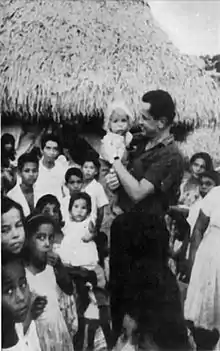
Torres
- Died: Camilo Torres Restrepo, 37, Colombian guerrilla leader who had renounced his position as a Roman Catholic priest in order to join the rebel National Liberation Army (ELN) fight the government. Torres was killed in a skirmish with the Colombian military near Bucaramanga, but his philosophy of a "Christian Revolution" would inspire other persons in Colombia.[49]
February 16, 1966 (Wednesday)
- One week before Ash Wednesday, Pope Paul VI issued the apostolic constitution Paenitemini, revising obligations for Roman Catholic Church adherents for Lent. The age at which abstinence was required was raised to 14 years old, and the number of universal days of fasting days was reduced from 40 days to only two (Ash Wednesday and Good Friday), and the days of obligatory abstinence to eight (Ash Wednesday, Good Friday, and the Fridays in between).[50]
- The twentieth and last nuclear explosion in Algeria was conducted in the desert in a test by France, near the village of In Eker.[51] Afterwards, until January 27, 1996, all French tests would take place at locations in the South Pacific Ocean, primarily at the atolls of Moruroa and Fangataufa.
- Thirty-six people were killed, and 53 injured, by two bombs placed on an express train in the Indian state of Assam. According to Railways Minister Ram Sabhag Singh, the train had been halted when a time bomb exploded in the rear compartment of a coach with passengers inside. An hour later, while the victims were still being removed, a second bomb exploded in the front of the train, killing rescue workers and more passengers.[52]
- Twenty-nine people on a commuter train were killed as they approached the Yugoslavian city of Split (now in Croatia), and 27 more were injured. The passenger train was impacted by a 19-car coal train that had been descending a steep grade when its brakes failed.[53]
- Sixteen coal miners died in an explosion near Kamp-Lintfort, West Germany.[54]
- J. Carlyle Sitterson became Chancellor of the University of North Carolina at Chapel Hill.[55]
February 17, 1966 (Thursday)
- Aeroflot Flight 65 crashed as it took off from Sheremetyevo International Airport near Moscow, in the first fatal accident involving the Soviet Tupolev Tu-114 turboprop airliner.[56] A wing of the jet struck a snowbank while accelerating down the runway, which had not been cleared of snow adequately. Reportedly, the plane — which was inaugurating the first Aeroflot service to Brazzaville in the French Congo — reached an altitude of 100 feet before coming down, and the cabin broke in two. Initial reports set the death toll at 48 of the 70 people on board,[57] though later reports confirmed the death toll at 21 of 48 people on board.
- At Geneva, representatives from Venezuela and the United Kingdom signed a treaty to delineate the boundary between Venezuela and British Guiana (now Guyana).[58]
- The "Three-point Proposal" for ending the Vietnam War was presented at the United Nations headquarters in New York by a spokesman for Secretary-General U Thant, calling for cessation of bombing of North Vietnam by the United States, a scaling down of military activities, and an agreement by all sides to enter into discussions with representatives of the Viet Cong.[59]
- The draft classification of world heavyweight boxing champion Muhammad Ali was reclassified from 1-Y (unfit for military service) to 1-A, after the armed services revised standards from accepting only the upper 15th percentile of IQ to the upper 30th percentile. The revision would lead to Ali's refusal to register on religious beliefs, his arrest, and the loss of his championship status.[60]
- The FIS Nordic World Ski Championships opened at the Holmenkollen ski arena in Oslo, Norway.
- Reg Withers entered the Australian Senate, filling the vacancy caused by the death of Senator Sir Shane Paltridge. In the Australian House of Representatives, Joe Clark became Father of the House, and would go on to be the tenth longest-serving member of the House of Representatives.[61]
- Died: Hans Hofmann, 85, German-born American abstract expressionist painter
February 18, 1966 (Friday)
- The consulate of the People's Republic of China in Phong Saly, Laos, was heavily strafed by gunfire, and the Beijing government charged that four American fighter jets had attacked "with more than 600 bullets", as well as dropping eight bombs to the east of the city, which was 20 miles from the border with China.[62]

Channing
- In an attempt to artificially boost the Nielsen ratings for a sweeps month television presentation of An Evening with Carol Channing, Rex Sparger conspired with Channing's husband, producer Charles Lowe, to pay viewers in 58 households in Ohio and Pennsylvania to watch the entire program. The Nielsen company's screening procedures detected the unusual spike of viewers in those locations, and omitted the areas from its sample that evening.[63] It would file a $1,500,000 lawsuit against Sparger on March 24,[64] which would be settled after Sparger signed a consent order conceding his attempt to distort the ratings. Sparger would reveal that he had found out the identities of contractors who serviced the meters placed on television sets, then followed them as they called on the sample homes.[65]
- Twenty-two people were killed, and 23 others seriously injured, when their bus plunged over a 70 foot high cliff outside of the seaside town of Ye in Burma. Burmese officials reported that the steering rod had snapped as the bus was driving on a curving mountain road.[66]
- Born: Phillip DeFreitas, England cricketer, in Scotts Head, Dominica
- Died: Grigori Nelyubov, 31, one of the twenty original Soviet cosmonauts, after being struck by a train in an apparent suicide attempt. Nelyubov and two other cosmonauts had been dismissed from the Soviet space program after getting into a fight with military guards on March 27, 1963.
February 19, 1966 (Saturday)
- Britain's Navy Minister, Parliamentary Under-Secretary of State for Defence Christopher Mayhew, and the First Sea Lord, Sir David Luce, resigned in protest after the government's decision to shift British airpower from carrier-based planes to land-based planes and to cancel the CVA-01 aircraft carrier programme.[67]
- The Central Committee of the Communist Party of the Soviet Union approved the Eighth Five-Year Plan, proposed by Premier Alexei Kosygin.[19]
- U.S. Senator Robert F. Kennedy became the first member of the Senate to break with President Johnson in proposing that the Viet Cong be allowed "a share of power and responsibility" in peace talks with the United States.[68] "There are three things you can do with such groups," Kennedy said in a speech, "Kill or repress them, turn the country over to them, or admit them to a share of power."[69]
- Died: Alfred P. Sloan, 90, American automotive executive who served as Chairman of the Board of General Motors Corporation from 1937 to 1956.
February 20, 1966 (Sunday)
- The Soviet Union revoked the citizenship of Soviet author Valery Tarsis, who had emigrated to the United Kingdom two weeks earlier.[70][71]
- The Norwegian oil tanker Anne Mildred Brovig collided with the British coaster MV Pentland off of the coast of West Germany near Heligoland. Both ships caught fire[72] and the Brovig sank, spilling 16,000 tons of its cargo of Iranian crude oil, the last major spill to threaten Germany. Between the use of dispersants and favorable weather, the oil slick disappeared without damaging the German coast.[73]
- Cecilia Cummins was born in Richmond, North Yorkshire, the fifth child of the Cummins family to have a February 20 birthday since 1952, a coincidence that has been noted in the Guinness Book Of World Records since 1977 under the category "Most siblings born on the same day". The book noted that the odds were one in 17,797,577,730.[74] Her arrival coincided with the birthdays of her sisters Catherine (14), Carol (13), Claudia (5) and her brother Charles (10).
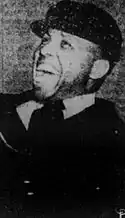
Umpire Ashford
- Emmett Ashford became the first African-American Major League Baseball umpire, hired by the American League after 15 years of umpiring in the minor leagues.[75]
- After the injection of contaminated waste water into the mountains of the Rocky Mountain Arsenal caused earthquakes in Denver, Colorado, the program was halted. Tremors had started one month after the first injection on March 8, 1962, then halted temporarily after a cessation of the process.[76]
- Born: Cindy Crawford, American model and actress, in DeKalb, Illinois
- Died: Chester Nimitz, 80, U.S. Fleet Admiral who commanded the Pacific Fleet in World War II, and later Chief of Naval Operations.
February 21, 1966 (Monday)
- In a televised press conference, French President Charles de Gaulle said that France would require command of all foreign troops and military institutions in France when the NATO agreement expired on April 4, 1969.[77] Soon afterward, De Gaulle would announce that France would withdraw on July 1, and that he wanted the troops, officers and bases of the United States and United Kingdom removed by April 1, 1967.[78]
- President Sukarno of Indonesia "reshuffled" his cabinet, starting with the removal of his Defense Minister, Abdul Haris Nasution, appointing enough sympathizers to create what was called the "Cabinet of 100 Ministers". Dismissing advisers who opposed the Communist Party of Indonesia (PKI) and replacing them with PKI sympathizers, he fired seven of his nine State Ministers, the Commanders of the Navy and the Army, and reassigned others in order to reduce the generals' authority. Within less than three weeks, he would be forced to hand over his executive authority to General Suharto.[79]
- Syria's Minister of Defence Muhammad Umran ordered the transfer of three key supporters of army chief Salah Jadid, Major-General Ahmad Suwaydani, Colonel Izzad Jadid and Major Salim Hatum.[80]
- The Senate Foreign Relations Committee approved Jack Hood Vaughn as Director of the Peace Corps, and Lincoln Gordon to replace him as Assistant Secretary of State for Inter-American Affairs. Senator Wayne Morse of Oregon cast the only dissenting vote. The Committee unanimously approved U.S. participation in the Asian Development Bank.[81]
February 22, 1966 (Tuesday)
.jpg.webp)
Veterok and Ugolyok
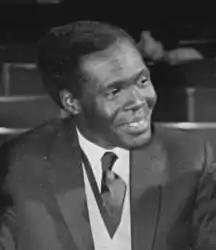
Milton Obote
- The Soviet Union launched two dogs, "Veterok" and "Ugolyok" (translated in the American press as "Breezy" and "Blackie", respectively) into orbit around the Earth on board the satellite Kosmos 110.[82] The two dogs would remain in orbit for 22 days and then safely return to Earth on March 16.[83]
- British Prime Minister Harold Wilson announced that the United Kingdom would withdraw its troops from the Aden Protectorate by 1968, endorsing the "Defence White Paper" that stated "we do not think it appropriate that we should maintain defence facilities there" after independence was granted.[84]
- Milton Obote, the Prime Minister of Uganda, called for a meeting of his cabinet. After discussions started, he called in soldiers and then placed five of the group (State Minister Grace Ibingira, Agriculture Minister Mathias Ngobi, Health Minister Emmanuel Lumu, Minister of Works Balaki Kirya and Labour Minister George Magezi)[85] under arrest on grounds that they had been "conspiring to overthrow the Government by violent means".[86]
- The Broadway production of Slapstick Tragedy: Two Plays by Tennessee Williams premiered at the Longacre Theatre. Despite Williams's success with productions such as The Glass Menagerie, A Streetcar Named Desire and Cat on a Hot Tin Roof, the double-bill of plays (The Mutilated and The Gnädiges Fräulein) would close after only seven performances.[87]
- The 1966 Australian Grand Prix was held at Lakeside International Raceway and was won by Graham Hill.[88]
February 23, 1966 (Wednesday)
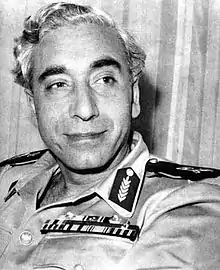
Amin
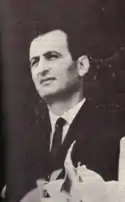
Jadid
- Major General Salah Jadid launched a coup d'état, arresting President Amin al-Hafiz, Prime Minister Salah al-Din al-Bitar, Speaker of Parliament Mansour Attrish, and the Defense Minister, Major General Mohammed Omran. Major Jedid had been leader of the extremist faction of the Ba'ath Party until a purge in December. A future President, Air Force General Hafez al-Assad, was named as the new Defense Minister.[80][89] Hafiz's private residence was attacked by troops led by Salim Hatum and Rifaat al-Assad. Jadid appointed Nureddin al-Atassi as the new figurehead President, and Yusuf Zu'ayyin was restored to office as Prime Minister.[90]
- Isaac Adaka Boro, leader of the rebel Ijaw Volunteer Force, captured the city of Yenagoa with a force of 159 youths, then declared the independence of the short-lived Niger Delta People's Republic; the Republic lasted only 12 days before police arrived from Lagos and arrested the rebels.[91]
- A British Defence White Paper, recommending withdrawal British presence in Aden, was published.[92]
February 24, 1966 (Thursday)
.jpg.webp)
Former President-for-Life Nkrumah
- A military coup in Ghana overthrew President-for-Life Kwame Nkrumah while he was making a state visit to Beijing.[93][94] Former Major General Joseph A. Ankrah, who had been fired the year before by Nkrumah, was named as the leader of the seven-man National Liberation Council that took control of the government. Across Ghana, enthusiastic crowds tore down statues that Nkrumah had erected for himself as "Redeemer of the Nation".[95] Declassified CIA and U.S. State Department documents, released in 2001, would show that the U.S., the U.K. and France provided the funding to the coup leaders.[96] Ankrah would be forced to resign on April 3, 1969, after being charged with corruption.[26]
- Two days after arresting cabinet members, Uganda's Prime Minister Milton Obote fired Sir Edward Mutesa and took over as the new President of Uganda.[97]
- Student protesters outside of the presidential palace in Jakarta were killed when Indonesian President Sukarno's guards fired into the crowd.[98]
- Born: Billy Zane, American film actor, in Chicago
February 25, 1966 (Friday)
- Pursuant to the peace agreement signed by both nations on January 10 in Tashkent, India and Pakistan completed their troop withdrawals from the disputed territory, returning to the locations that they had occupied as of August 5, 1965, prior to the beginning of the Indo-Pakistani War of 1965.[99] The last Indian troops left at sunset[100]
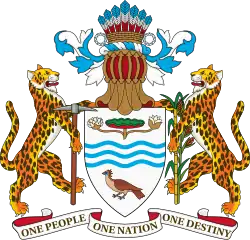
Guyana's coat of arms
- The coat of arms of Guyana was granted by the College of Arms.
- Sir Ivan Stedeford Hospital opened in Ambattur, in India's Chennai state.
- Born: Téa Leoni, American television and film actress, in New York City
February 26, 1966 (Saturday)
- In South Vietnam, South Korean soldiers allegedly killed 380 villagers in the Bình An commune (today known as xã Tây Vinh) in Tây Sơn District of Bình Định Province.[101]
- AS-201, the first test flight of the Saturn 1-B rocket and of the Apollo capsule, was successful. The unmanned space craft was sent 310 miles into space, and the capsule's heat shields withstood 5,000 degrees of heat during re-entry through the Earth's atmosphere. The vehicle was recovered in the South Atlantic Ocean, 38 miles from Ascension Island, by the aircraft carrier USS Boxer.[102][103][104]
- The Soviet Union made its first test of an intercontinental ballistic missile referred to by them as the RT-2, and in the United States as the SS-13 Savage, but the launch was unsuccessful. A liftoff would be achieved on November 4 "and even then its warhead disintegrated on reentry".[105]
- Andrew Brimmer became the first African-American to be appointed a governor of the Federal Reserve System.[106] He would remain with "the Fed" until 1974, then serve again in the 1990s as Vice-Chairman.[107]
- As the Cultural Revolution progressed, China's television stations were ordered to broadcast model plays (Yang Ban Xi) as the sole entertainment.[108]
- Born:
- Jennifer Grant, American television actress (Beverly Hills 90210), to actors Cary Grant and Dyan Cannon, in Burbank, California
- Najwa Karam, Lebanese singer, in Zahlé
- Died: Vinayak Damodar Savarkar, 82, Indian pro-independence activist[109][110] politician, poet and playwright
February 27, 1966 (Sunday)
- In elections for Bulgaria's parliament, all 416 candidates of the Fatherland Front won election without opposition. Of those, 280 were members of the Bulgarian Communist Party and 99 from the affiliated Bulgarian National Agrarian Union.[111] In the yes/no vote, the slate won overwhelming approval, with a reported 5,744,072 yes votes and 2,089 against them. The turnout was said to have been 99.6 percent.[112] Prime Minister Todor Zhivkov, General Secretary of the BCP, continued in office as Prime Minister.
- Pu Laldenga and other leaders of the Mizo National Front (MNF) planned an uprising to take place on March 1.
February 28, 1966 (Monday)
- American astronauts Charles Bassett, 34, and Elliot See, 38, were killed in an aircraft accident in St. Louis, Missouri, during training for the Gemini program.[113][114][115] See and Bassett, who had been scheduled to travel into space on Gemini 9A in May, died when their T-38 jet trainer struck the roof of the three-story McDonnell Aircraft building during their approach to the St. Louis Municipal Airport, and plunged into a parking lot. Backup astronauts Thomas P. Stafford and Eugene Cernan, who had been flying behind See and Bassett in another T-38 plane, would replace them on the Gemini 9A mission.
- Dr. Rolando Cubela Secades was arrested in Havana, Cuba, along with a fellow Cuban Army Major, Ramon Guin, on charges that they were agents for the U.S. Central Intelligence Agency who were plotting to assassinate Fidel Castro, Cuba's Prime Minister.[116][117] A CIA report, dated April 25, 1967, and declassified in 1997, would confirm that Cubela had been contacted on numerous occasions with different plans for a Castro assassination.[118][119] After serving 13 years of a 25-year prison sentence, Cubela would be pardoned by Castro on August 27, 1979, and allowed to leave Cuba.[120]
- British Prime Minister Harold Wilson called a General Election in the United Kingdom, to be held on 31 March.
- Emperor of Ethiopia Haile Selassie opened an Organization of African Unity meeting of foreign ministers.[19]
- At the 23rd Golden Globe Awards, the winning films were Doctor Zhivago and The Sound of Music.
References
- "W. Germany Buys Freedom for 2,600", Ottawa Journal, February 1, 1966, p1
- "Bonn Frees Political Prisoners" , Corsicana (TX) Daily Sun, February 2, 1966, p18
- J. R. T. Wood, A Matter of Weeks Rather Than Months: The Impasse Between Harold Wilson and Ian Smith Sanctions, Aborted Settlements and War 1965-1969 (Trafford Publishing, 2012) p50
- "Florida Train Kills 18", Kansas City Times, February 2, 1966, p1
- "18 Killed In Miami Bus-Train Crash", Sarasota (FL) Herald-Tribune, February 2, 1966, p1
- David Shayler, Disasters and Accidents in Manned Spaceflight (Springer, 2000) p38
- "Helicopter Collides With Vulture; 24 Die", Bridgeport (CT) Telegram, February 3, 1966, p1
- Sean Scalmer, Dissent Events: Protest, the Media, and the Political Gimmick in Australia (University of New South Wales Press, 2002) pp4-5
- Jenkins, Jeff; Molly Meldrum (2007). "Go-Set - The pioneering pop paper". Molly Meldrum presents 50 years of rock in Australia. Melbourne: Wilkinson Publishing. pp. 22–31. ISBN 978-1-921332-11-1. Retrieved 2009-03-27.
- Paolo Ulivi, Lunar Exploration: Human Pioneers and Robotic Surveyors (Springer, 2004) p62
- Tim Furniss, A History of Space Exploration: And Its Future (Globe Pequot, 2003) p54
- John Ion, Laser Processing of Engineering Materials: Principles, Procedure and Industrial Application (Butterworth-Heinemann, 2005) p18
- "Belgian King Tells Premier To Stay On", San Antonio Express and News, February 6, 1966, p10-A
- "Pensberger, German Sled Driver, Dies After Crash", Chicago Tribune, February 6, 1966, p2-3
- Nohlen, D & Stöver, P (2010) Elections in Europe: A data handbook, p1165 ISBN 978-3-8329-5609-7
- Tim Brooks and Earle F. Marsh, The Complete Directory to Prime Time Network and Cable TV Shows, 1946-Present (Random House, 2009) p905
- "Evolution of the world record 10,000 meters Men". SpeedSkatingStats.com. Retrieved 29 August 2012.
- "Sets World Skate mark", Chicago Tribune, February 7, 1966, p3-1
- Mary Katharine Hammond, "The Month in Review", Current History, April 1966.
- Foreign Relations of the United States, 1964–1968, Volume IV, Vietnam, 1966, "January 31–March 8: The Honolulu Conference; Congressional Hearings on the War", ed. David C. Humphrey & David S. Patterson, 1998.
- Lynn Boyd Hinds, Broadcasting the Local News: The Early Years of Pittsburgh's KDKA-TV (Penn State Press, 2010) p33
- Thomas M. Kitts, John Fogerty: An American Son (Routledge, 2015)
- Kevin Blackburn and Karl Hack, War Memory and the Making of Modern Malaysia and Singapore (National University of Singapore Press, 2012) pp237-238
- "NATIONAL HOCKEY LEAGUE ADDS 6 CLUBS", Chicago Tribune, February 10, 1966, p3-1
- Ed Carlson, Technical Analysis Trading Methods and Techniques (Financial Times Press, 2011)
- Heads of States and Governments Since 1945, by Harris M. Lentz (Routledge, 2014)
- Barbara Seaman, Lovely Me: The Life of Jacqueline Susann (Seven Stories Press, 1996) p303
- Walter Thabit, How East New York Became a Ghetto (New York University Press, 2005)
- cricinfo: England tour of Australia, 1965/66. Accessed 7 April 2014
- McDowell, Jonathan. "Launch Log". Jonathan's Space Page. Retrieved 2009-11-14.
- "Words of Condemnation and Drinks of Reconciliation Massacre in Vin Dinh Province All 380 People Turned into Dead Bodies Within an Hour". Hankyoreh. 1999-09-02. Retrieved 2011-03-02.
- "제8장 조선 전쟁과 베트남 전쟁". Dong-a Ilbo. 2008-03-04. Archived from the original on 2011-07-10. Retrieved 2011-03-02.
- "Bangladesh", in Historical Dictionary of Pakistan, by Shahid Javed Burki (Rowman & Littlefield, 2015) p103
- Yan Jianqi and Gao Gao (D. W. Y. Kwok, translator), Turbulent Decade: A History of the Cultural Revolution (University of Hawaii Press, 1996) p31
- Dan J. O'Keefe, The Real Festivus: The True Story Behind America's Favorite Made-up Holiday (Penguin, 2005)
- to the World, Festivus is come.html|"Fooey to the World: Festivus Is Come", by Allen Salkind, New York Times, December 19, 2004
- Rabbi's brutal 1966 murder witnessed by hundreds, by Jerome Hansen and Susan Holmes, "Detroit Free Press", February 12, 2016
- Rabbi Morris Adler Shot in His Synagogue in Detroit; Condition Grave, February 13, 1966, "Jewish Telegraphic Agency"
- Laurence R. "Nuke" Newcome, Unmanned Aviation: A Brief History of Unmanned Aerial Vehicles (American Institute of Aeronautics and Astronautics, 2004) p90
- Steven J. Zaloga, Red SAM: The SA-2 Guideline Anti-Aircraft Missile (Osprey Publishing, 2011) p18
- Karla Gower, Public Relations and the Press: The Troubled Embrace (Northwestern University Press, 2007) p75
- Michael R. Lemov, Car Safety Wars: One Hundred Years of Technology, Politics, and Death (Rowman & Littlefield, 2015) p82
- "DOLLARS, CENTS TODAY— PM expects 'C' change to be smooth", The Age (Melbourne), February 14, 1966, p1
- David Solomon and Tom Spurling, The Plastic Banknote: From Concept to Reality (CSIRO Publishing, 2014) pp1-2
- "Two Soviet Writers Get Prison Terms", Chicago Tribune, February 15, 1966, p3
- "Burmese Wreck Toll Rises To 23", Cumberland (MD) Evening Times, February 15, 1966, p1
- "Gas Kills 17 in Swiss Tunnel", Chicago Tribune, February 16, 1966, p1
- Political Studies and Public Administration Department of the American University of Beirut (1966). Chronology of Arab Politics 4. American University of Beirut.
- Enrique Dussel, A History of the Church in Latin America (Wm. B. Eerdmans Publishing, 1981) p166
- Lauren Pristas, The Collects of the Roman Missals: A Comparative Study of the Sundays in Proper Seasons before and after the Second Vatican Council (A & C Black, 2013) p119
- Dennis Kumeta, Managing the Transition: Renewable Energy and Innovation Policies in the UAE and Algeria (Routledge, 2014)
- "Bombs Kill 36 Indians Riding Train", Nashua (NH) Telegraph, February 18, 1966, p3
- "Train Crash Kills 29", Kansas City Times, February 17, 1966, p3-C
- "Blast Kills 16 Miners In Germany", Troy (NY) Record, February 17, 1966, p2
- Chancellor of Change - The Legacy of J. Carlyle Sitterson '31
- Aviation Safety Network
- "Soviet Tu-114 Crash Kills 48 in Moscow", Chicago Tribune, February 18, 1966, p1
- J. A. S. Grenville and Bernard Wasserstein, Major International Treaties of the Twentieth Century: A History and Guide with Texts (Taylor & Francis, 2000) p791
- M. S. Rajan and T. Israel, "The United Nations and the Conflict in Vietnam", in The Vietnam War and International Law, Volume 4: The Concluding Phase (Princeton University Press, 2015) p124
- Terry Crowdy, Military Misdemeanors: Corruption, Incompetence, Lust and Downright Stupidity (Osprey Publishing, 2007) pp218-219
- "Papers of Joseph Clark". National library of Australia. October 2000. Retrieved 2007-10-25.
- "China Charges Attack by U.S.", Chicago Tribune, February 20, 1966, p1
- "Industrial Spying Upsets Nielsen", Newport (RI) Daily News, March 3, 1966, p15
- "Nielsen Sues Former Congress Investigator", Corpus Christi (TX) Caller-Times, March 25, 1966, p26
- Hugh Malcolm Beville, Audience Ratings: Radio, Television, and Cable (Routledge, 1988) p98
- "22 Riding Bus Hurled to Death", Albuquerque (NM) Journal, February 19, 1966, p1
- "British Naval Boss Resigns Over Policy", Chicago Tribune, February 20, 1966, p4
- Richard A. Greenwald, Exploring America's Past: A Reader in Social, Political, and Cultural History, 1865-present (University Press of America, 1996) p242
- David L. DiLeo, George Ball, Vietnam, and the Rethinking of Containment (University of North Carolina Press Books, 1991) p141
- Perrucci, Robert; Pilisuk, Marc (1968). The triple revolution: social problems in depth. Little, Brown. pp. 325.
- "Russia Lifts Citizenship of Tarsis", Chicago Tribune, February 21, 1966, p3
- "Katastrophen". Der Spiegel (in German). No. November 1966. Retrieved 20 July 2011.
- Sebastian A. Gerlach, Marine Pollution: Diagnosis and Therapy (Springer, 2013) p84
- Guinness World Records website
- "African-American Umpires", in A Game of Inches: The Stories Behind the Innovations that Shaped Baseball, Volume 1 (Rowman & Littlefield, 2006)
- Harsh K. Gupta and B.K. Rastogi, Dams and Earthquakes (Elsevier, 2013) p84
- "NATO Warned by De Gaulle", Chicago Tribune, February 22, 1966, p1
- Helga Haftendorn, NATO and the Nuclear Revolution: A Crisis of Credibility, 1966-1967 (Clarendon Press, 1996) pp1-2
- Will Fowler, Britain's Secret War: The Indonesian Confrontation, 1962-66 (Osprey Publishing, 2006) p41
- Seale, Patrick (1990). Asad of Syria: The Struggle for the Middle East. University of California Press. ISBN 978-0520069763. p 101
- "Vaughn, Gordon, Asia Bank Are Approved", Washington Post (UPI), February 22, 1966.
- "Russ Orbit Space Dogs— Moon Probe, or a Landing, Is Indicated", Chicago Tribune, February 23, 1966, p1
- National Space Science Data Center, NASA.gov
- Clive Jones, Britain and the Yemen Civil War, 1962-1965: Ministers, Mercenaries and Mandarins : Foreign Policy and the Limits of Covert Action (Sussex Academic Press, 2010) p190
- Apolo Robin Nsibambi, National Integration in Uganda 1962-2013 (Fountain Publishers, 2014) p43
- "The Legitimacy of the Uganda Government in Buganda", by Archie Mafeje, in Government and Rural Development in East Africa: Essays on Political Penetration (Springer, 2012) pp101-102
- Editor's notes to New Selected Essays: Where I Live, by Tennessee Williams and John S. Bak, (New Directions Publishing, 2009) p201
- White, Des (1986). "1966". In Howard, Graham (ed.). The Official 50-race history of the Australian Grand Prix. Gordon, NSW: R & T Publishing. pp. 310–319. ISBN 0-9588464-0-5.
- "OVERTHROW SYRIA REGIME", Chicago Tribune, February 23, 1966, p1
- Malik Mufti, Sovereign Creations: Pan-Arabism and Political Order in Syria and Iraq (Cornell University Press, 1996) p176
- "The Transformation of Ethno-Regional Identities in Nigeria", by Jibrin Ibrahim, in Identity Transformation and Identity Politics Under Structural Adjustment in Nigeria (Nordic Africa Institute, 2000) p46
- Dockrill S. (2002) The Completion of the Defence Review, January–February 1966. In: Britain’s Retreat from East of Suez. Cold War History Series. Palgrave Macmillan, London. Print ISBN 978-1-349-40703-3 Online ISBN 978-0-230-59778-5
- Jon Kraus (April 1966). "Ghana Without Nkrumah - The Men In Charge". Africa Report. Koranteng Ofosu-Amaah. Archived from the original on 2007-05-19. Retrieved 2007-03-21.
- "Report Army Seizes Ghana, Ousts Cabinet", Chicago Tribune, February 24, 1966, p1
- "Army Ousts Nkrumah as Freedom Foe", Chicago Tribune, February 25, 1966, p1
- Ama Biney, The Political and Social Thought of Kwame Nkrumah (Palgrave Macmillan, 2011) p157-158
- Onek C. Adyanga, Modes of British Imperial Control of Africa: A Case Study of Uganda, c.1890-1990 (Cambridge Scholars Publishing, 2011) p161
- Francis Pike, Empires at War: A Short History of Modern Asia Since World War II (I.B.Tauris, 2011)
- Jacques L. Koko and Essoh J. M. C. Essis, Determinants of Success in UN Peacekeeping Operations (University Press of America, 2012) p33
- "India, Pakistan complete troops pull-out", The Indian Express (Madras), February 26, 1966, p1
- Ku Su Jeong. "Words of Condemnation and Drinks of Reconciliation Massacre in Vin Dinh Province All 380 People Turned into Dead Bodies Within an Hour". Hankyoreh. Retrieved 2011-02-24.
- "U.S. Moon Craft Proves Spacewrothy in 1st Test", Chicago Tribune, February 27, 1966, p1
- David Shayler, Apollo: The Lost and Forgotten Missions (Springer, 2002) p109
- David Harland, NASA's Moon Program: Paving the Way for Apollo 11 (Springer, 2010) pp406-407
- Steven J. Zaloga, The Kremlin's Nuclear Sword: The Rise and Fall of Russia's Strategic Nuclear Forces 1945-2000 (Smithsonian Institution, 2014)
- "Andrew Brimmer, First Black on Fed Board, Dies at 86". The New York Times. 2012-10-12. Retrieved 2012-10-12.
- "Brimmer, Andrew", in Encyclopedia of African American Society, Gerald D. Jaynes, ed. (SAGE Publications, 2005) p144
- Yuanzhi Zhou, Capitalizing China's Media Industry: The Installation of Capitalist Production in the Chinese TV and Film Sectors (ProQuest, 2007 p76
- Chandra, Bipan (1989). India's Struggle for Independence. New Delhi: Penguin Books India. p. 145. ISBN 978-0-14-010781-4.
- Keer, Dhananjay (1966). Veer Savarkar. Bombay: Popular Prakashan. ISBN 978-0-86132-182-7. OCLC 3639757.
- Richard F. Staar, Communist Regimes in Eastern Europe, Fourth Edition (Hoover Institution Press, 1982) p43
- Nohlen, D & Stöver, P (2010) Elections in Europe: A data handbook, p368 ISBN 978-3-8329-5609-7
- NASA biography for Charles Bassett
- NASA biography for Elliot See
- "2 SPACE MEN PERISH IN JET", Chicago Tribune, February 27, 1966, p1 Chicago Tribune, February 27, 1966, p1
- "2 Castro Aides Held as Agents for CIA", Bridgeport (CT) Post, March 2, 1966, p17
- "Two Held in Castro Assassination Plot", Corpus Christi (TX) Caller-Times, March 5, 1966, p1
- "REPORT ON PLOTS TO ASSASSINATE FIDEL CASTRO (1967 INSPECTOR GENERAL'S REPORT)", Mary Ferrell Foundation
- CIA Targets Fidel: Secret 1967 CIA Inspector General's Report on Plots to Assassinate Fidel Castro (Ocean Press, 1996)
- "Cuba Frees CIA agent", Ottawa Journal, August 28, 1979, p13
This article is issued from Wikipedia. The text is licensed under Creative Commons - Attribution - Sharealike. Additional terms may apply for the media files.